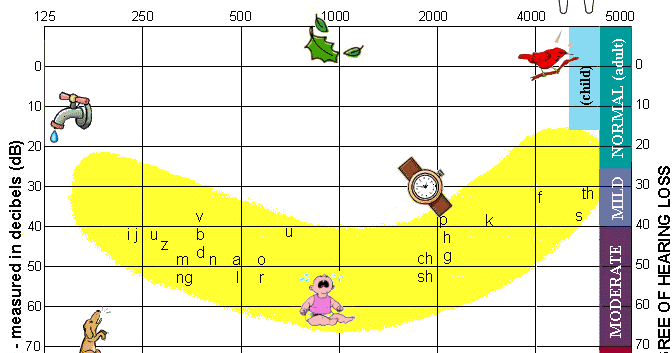You are just fine right? It's not that you can't spend a few thousand dollars. You're getting by now, so why pay so much to have a machine do what you can do yourself, right? You KNOW the dementia study, you KNOW about increased falls, but just can't reconcile it in your head.
Did you know that the average hearing aid candidate gets fitted seven years after the decline begins? Why?
There's a few reasons. First of all, what we refer to as the "speech banana", the intensity of most communication, is primarily at the mild to moderate level. Someone who is borderline or mild may not have any difficultly with speech sounds, or may only struggle with specific letters.

The degradation of hearing is so slow for most people, that it may take seven years to hit a loss with mild to moderate severity, but by the time you have reached that level, you have already lost around 20% of your ears, and that will likely never return. With that slow slope, it's so hard to notice a difference day to day, and easy to deny the problem.
The second reason I see people holding off on hearing aids is because they don't want to look "old". The public perception of hearing aids is that they still look like this:

Even if hearing instruments still looked this bulky, nothing looks as old as cupping your ear and yelling "WHAT?" a dozen times a day. Luckily, even the largest hearing aids today are not this large. As far as looking "old" goes, there are styles of hearing aid that are very modern and discreet. You could always look into a CIC solution, which is molded into the ear canal, such as an Oticon Opn custom, or Signia Insio. Using smartphone apps can also further disguise your hearing instrument by taking the place of making manual adjustments. Fiddling with the instrument itself always brings attention to it.
The final reason behind people refusing to get hearing instruments is simple denial. Some patients cannot be convinced of an actual problem, even if they are far beyond the speech banana, and are completely uninterested in the aesthetic.
You cannot know what you don't know, and you cannot know what you don't hear if you are not hearing it. At the end of the day, the patient will never receive a successful fitting if they cannot reconcile that they are missing sounds. Birds, alarms, cars, crickets, the wind...these aren't so functionally important, but they are the types of sounds that you may not even know you are missing. If you go into a hearing healthcare office, even at the suggestion of a spouse or child, give your specialist a chance to prove what you've been missing. It's easier to see what someone doesn't have from a third perspective, which is why the SPOUSE (and not you) probably saw the problem to begin with!


